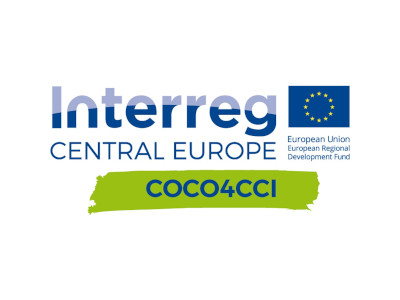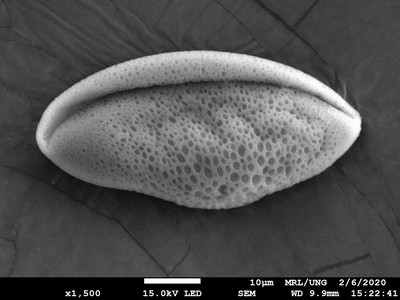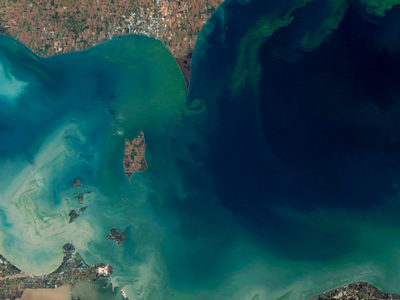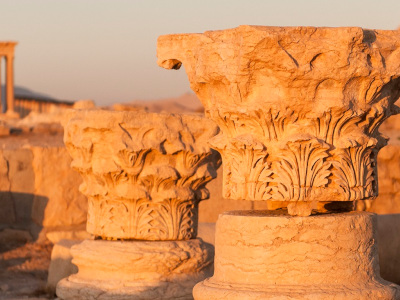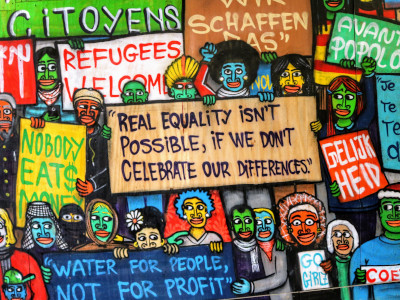This section presents all past projects related to Ca' Foscari's Global Challenges. To discover the on-going projects, please visit the page Projects.
Building resilience of society to natural disasters
There has been an explosion of resilience-based methods and tools in the literature and practice to address community resilience, but the development of comprehensive taxonomy and quantification tools to value chains is still lacking. Moreover, understanding the barriers to the adoption of resilience thinking through project life cycle is of crucial importance. Thsi is the aim of teh project "Building resilience of society to natural disasters: improved methodologies and solutions for Italy and USA". The ultimate result is a resilience based approach that quickly and efficiently improves cognitive decision making and trust with institutional players who must address a wide scope of adverse events. Both PIs are part of significant national and international projects, including chairing the 2019 Fifth World Congress on Risk, in Cape Town, and will be able to use their projects to build significant new collaboration of the two countries.
Researcher: Andrea Critto
Duration: 18/04/2019 - 31/12/2022
Cross-sectoral cooperation in culture and creative industry
The Culture and Creative Industry (CCI) sector lacks a transnational and cross-sectoral shared vision on what could be its contribution to economic and social growth in central Europe, along with a cooperation system to foster innovation processes. COCO4CCI project (Culture and Creative Industries Cooperation Collider) will build capacities for cross-sectoral cooperation in advanced manufacturing (AVM), by mapping CCI potentials aimed to create a transnational CCI collider network. A training programme will accompany facilitators in technology development, future trends setting and a mind-set definition in advanced manufacturing.
Website
Researcher: Giovanni Vaia
Duration: 01/04/2019 - 31/03/2022
Time Machine: Big data of the past for the future of Europe
The project Time Machine will give Europe the technology to strengthen its identity against globalisation, populism and increased social exclusion, by turning its history and cultural heritage into a living resource for co-creating its future. The FET Flagship will develop a large-scale digitisation and computing infrastructure mapping millennia of European historical and geographical evolution, transforming kilometres of archives, large collections from museums and libraries, and geo-historical datasets into a distributed digital information system. To succeed, a series of fundamental breakthroughs are targeted in Artificial Intelligence and ICT, making Europe the leader in the extraction and analysis of Big Data of the Past.
Time Machine will bring a new era of open access to sources, where past and on-going research are open science. A dissemination programme aims to further strengthen the rapidly growing ecosystem, currently counting 95 research institutions, most prestigious European cultural heritage associations, large enterprises and innovative SMEs, influential business and civil society associations, and international and national institutional bodies.
Project website / EU Cordis database
Researcher: Dorit Raines
Duration: 01/03/2019 - 29/02/2020
Funding: Horizon 2020 Excellent Science: Future and Emerging Technologies (FET)
Nano-region: innovation through nanotechnologies
Nano-Region ("Una rete aperta per l'innovazione attraverso le nanotecnologie") aims at developing a network of research centres and parks with a nano-technological vocation focused on promoting technology transfer. The network, aimed at businesses, will offer access to enabling technologies and contribute to creating a new culture of innovation, through a programme of targeted open events, a consultancy service, and feasibility studies, responding to the needs expressed by individual businesses and stimulating the creation of new products, markets and businesses.
Website
Researcher: Alvise Benedetti
Duration: 01/02/2019 - 31/03/2022
MEDREGION - Marine strategy framework
MEDREGION - Support Mediterranean member states towards implementation of the marine strategy framework directive new GES decision and programmes of measures and contribute to regional/subregional cooperation
The project aims to provide the necessary support to the CIS for the coordinated implementation of the New GES Decision and to provide a useful platform for the necessary Regional and Sub-regional cooperation, in order to support the further development of the Programmes of Measures. It is precisely under this strategic perspective that the involvement of the UNEP/MAP system (UNEP/MAP member of the Advisory Board, INFO/RAC, RAC/SPA, PLAN BLUE partners) plays an essential role, taking into account the regional and cross-border aspects that involve both the EU context and the third Countries.
Website
Researcher: Antonio Marcomini
Duration: 01/02/2019 - 31/01/2021
NETCHER: Stopping illicit trade and protection of endangered cultural heritage
The last decades have witnessed a variety of initiatives promoted by a diverse set of actors engaged in the protection of endangered cultural heritage and in stopping illicit trade, initiatives that have tried to bring solutions, remediation, methods and approaches to tackle looting and trafficking. NETCHER (NETwork and digital platform for Cultural Heritage Enhancing and Rebuilding) seeks to address the complex challenge of harmonising and bringing together these worthy, but often disconnected initiatives by using a participative approach that will result in the establishment of a structured network (defined as a Social Platform) drawing together a broad range of players such as international bodies, umbrella organizations, national governments, researchers, public policy makers, NGOs, as well as public and private foundations. The Platform will take charge of the systematizing and framing of all the emerging best practices in order to enhance and capitalize on the experiences of the partnership members at an international level for building a joint action plan with shared toolkits and a research and innovation roadmap.
Project website / EU Cordis database
Researchers: Cristina Tonghini, Arianna Traviglia
Duration: 01/01/2019 - 31/12/2020
Fundinig: Horizon 2020 Societal Challenges: Europe In A Changing World
SSHOC - Social Sciences & Humanities Open Cloud
Social Sciences & Humanities Open Cloud (SSHOC) is a project funded by the EU framework programme Horizon 2020 and unites 20 partner organisations and their 27 associates in developing the social sciences and humanities area of the European Open Science Cloud (EOSC). During the 40-month lifespan of the project, SSHOC will transform the current social sciences & humanities data landscape with its disciplinary silos and separate facilities into an integrated, cloud-based network of interconnected data infrastructures.
Project website / EU Cordis database
Researcher: Agar Brugiavini
Duration: 01/01/2019 - 30/04/2022
Funding: Horizon 2020
SASPAS - Safe Anchoring and Seagrass Protection in the Adriatic Sea
The overall objective of the project is to improve seagrass preservation and restoration through laying safe anchorage innovative systems, performing pilot transplantations, carrying out monitoring activities and by defining an integrated management system for seagrasses in Adriatic area. The project will spend 30 months on three research sites: Panzano Bay, Monfalcone (IT), National Park Kornati (CRO) and Brindisi Coast in the Dune Costiere Natural Park of Torre Canne to Torre San Leonardo (IT). The SASPAS project is financed by the European Foundation for Regional Development under the Interreg V-A Program IT-CRO CBC (Priority Axis 3- Environment and Cultural Heritage). The lead partner is the Municipality of Monfalcone, and the project also includes seven (7) partners from Italy and Croatia. CoNISMa applied with the Local Research Unit of Trieste.
Website
Researcher: Adriano Sfriso
Duration: 01/01/2019 - 31/03/2022
SIforREF – Social policies for refugees integration
The challenge that SIforREF addresses is combating the risk of marginalization of refugees after the reception phases, which are different in each country, through the design and implementation of social innovation methodologies. The project aims to facilitate refugees’ autonomy by enhancing or launching refugee integration policies at regional and local level (countries involved: Italy, Germany, Austria and Slovenia). To achieve this objective, refugee integration should be included in the decisional agenda both at local and transnational level and policy-makers should adopt inclusive measures in governance. The complexity of this issue requires a mutual learning among central European regions, especially neighbourhood regions like those involved in the project.
Website
Researcher: Francesca Campomori
Duration: 01/01/2019 - 31/12/2021


